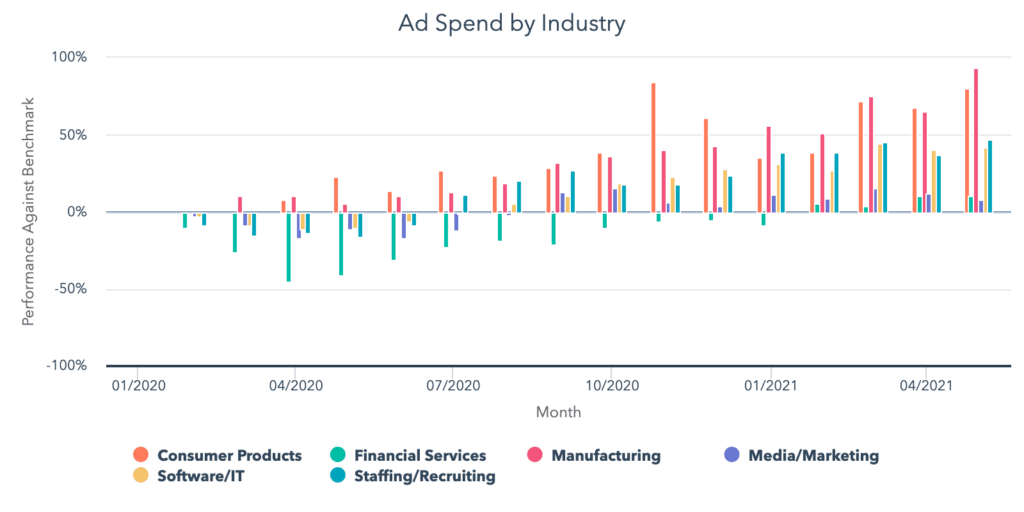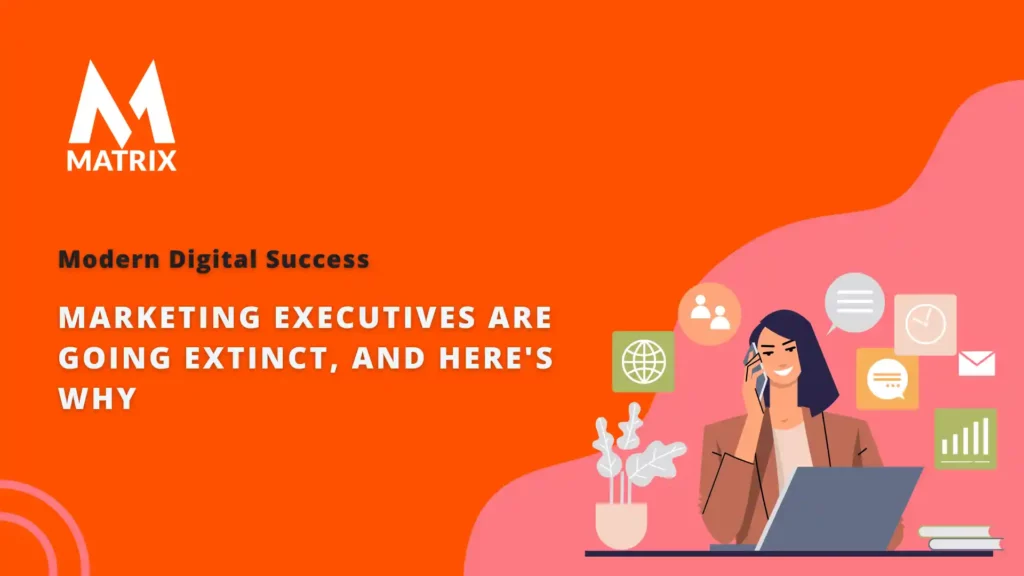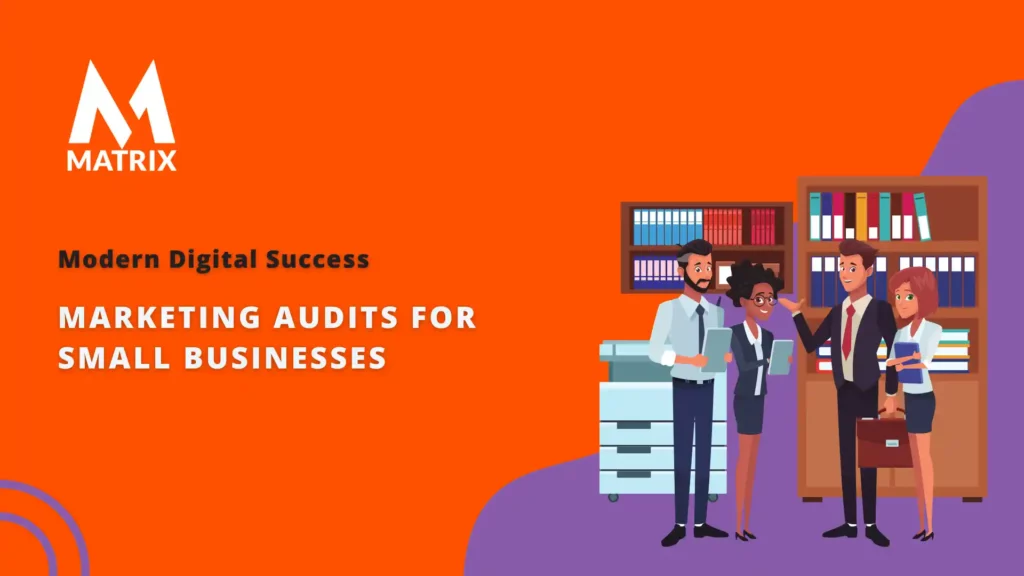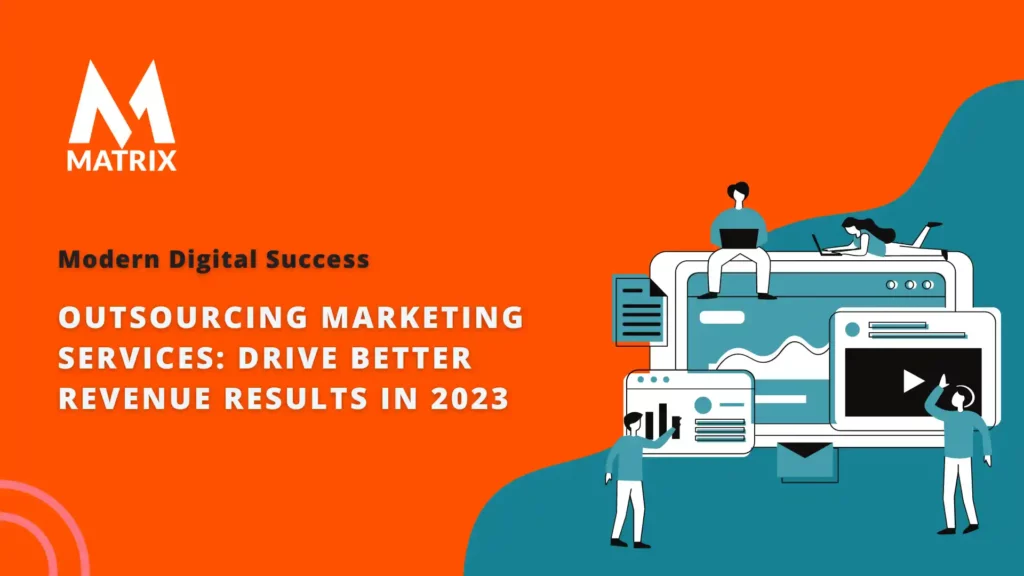Marketing Executives Are Going Extinct, and Here’s Why
Marketing Executives Are Going Extinct, and Here’s Why
Learn Why Marketing Executives Are Going Extinct, and Here’s Why
As technology advances and the digital landscape evolves, traditional marketing executives are becoming increasingly obsolete. Companies now prefer data-driven solutions that provide greater accuracy and cost savings over hiring a go-between for advertising or promotion.
This blog post will discuss why this shift is happening, how it affects the industry, and what skills modern marketers must possess to stay relevant in today’s ever-evolving digital world.
From creating new digital business models to digitizing products and services to developing value touchpoints through digital ecosystems–we’ll explore what it takes to be successful in 2023.
Are you a marketing executive struggling to stay relevant in the digital age?
As technology advances, traditional marketing executives are becoming obsolete.
Companies now prefer data-driven solutions that provide greater accuracy and cost savings over hiring an intermediary for advertising or promotion. Learn why this shift is happening, how it affects the industry, and what skills modern marketers must possess to stay competitive in today’s ever-evolving digital world.
With new digital business models, digitized products and services, and value touchpoints through digital ecosystems–you can be successful in 2023 if you have the right skill set.
Read our blog post to learn more about staying ahead of the curve as a modern marketer!
In 2022, CMO turnover rates skyrocketed to new heights. According to a report published by the Department of Commerce, the number of Chief Marketing Officers (CMOs) leaving their positions in the United States increased by 78% compared with 2019. The report also showed that most of these CMOs left their jobs after less than two years in office.
The increase in CMO turnover can be attributed to several factors, including the rapid evolution of digital marketing technology and changing consumer demands. Many organizations are now turning to data-driven solutions and cutting out the traditional middleman entirely regarding advertising and promotion. As a result, many marketing executives needing more digital marketing skills are becoming obsolete.
Additionally, companies today need experienced professionals who understand how to use emerging technologies such as artificial intelligence (AI) and machine learning (ML). They must also have experience leveraging online platforms such as social media and email automation for targeted campaigns and developing value touchpoints through digital ecosystems that create more compelling customer experiences.
The rapid growth of digital marketing has prompted many organizations to make significant investments in modernizing their marketing departments. In 2022 alone, organizations spent an estimated $62 billion on digital marketing activities – an increase from $54 billion in 2020 – according to a survey conducted by Deloitte Consulting LLP. Of this amount, 61% was spent on hiring new talent or training existing employees with new skills related to digital marketing.
With all these changes, it’s no surprise that CMO turnover has been so high in recent years. Organizations need executives who can keep up with the pace of change and understand how best to capitalize on new opportunities presented by digital technology. A strong understanding of data science and analytics is essential for those looking for employment opportunities within this field.
What do marketing executives do?

Marketing executives play an important role in helping companies promote their products and services, build customer relationships, and create a positive brand image.
They are responsible for developing and implementing effective marketing strategies that meet the company’s goals. This includes research, analysis, creative campaigns, advertising plans, sales support efforts, communication initiatives, and more.
Marketing executives must have strong analytical skills to assess customer needs and market trends. They also need to be knowledgeable about new digital technologies such as artificial intelligence (AI) and machine learning (ML).
CMOs must be familiar with online platforms such as social media and email automation for targeted campaigns. In addition to these technical skills, marketing executives must understand how to develop value touchpoints through digital ecosystems that create compelling customer experiences.
Problems for CMOs in professional services about brand storytelling
The emergence of digital marketing has caused a major shift in how brands communicate with their customers. As such, CMOs in professional services must be adept at crafting compelling brand stories that captivate audiences and differentiate their brand from the competition. Unfortunately, there are several challenges to doing this effectively.
First, professional services firms often need a unified approach to storytelling and tend to rely on individual contributors for content development. The brand story can need more consistency and clarity across different channels and platforms. Creating an emotional connection with customers can be easier with a consistent, coherent narrative.
Second, CMOs must understand how customers receive and interact with content across different channels. For example, what works on Instagram may translate poorly to LinkedIn or other social media platforms due to differences in user behaviors and preferences.
While many companies still use email marketing, its effectiveness is waning as more customers prefer real-time live chat or SMS communication. As such, CMOs must understand customer behavior patterns across different channels to craft messages that resonate with their target audience.
Content for professional services firms must often be tailored for highly specific industries and customer segments. This means that CMOs need to possess deep knowledge about the industry they are targeting and an understanding of the language used within the sector to craft compelling stories that will reach their desired audience. Furthermore, CMOs must remain up-to-date on industry trends to develop content strategies that stay relevant over time.
Creating compelling brand stories for professional services firms presents unique challenges for modern marketers who must rise to these difficulties to capture their target audience’s attention and inspire action within those audiences.
To do this effectively requires technical skills related to digital marketing technology and expertise concerning customer behaviors and industry trends that will help them craft relevant messages that resonate with today’s consumers.
AIContentPad, an Artificial Intelligence-Powered Digital Content Platform
Imagine eliminating 65% of waste in your marketing programs – wouldn’t that be great?
What if you could generate content better, faster, and more affordable than ever before
AIContentPad is more than just another content tool. It’s a transformative, AI-driven platform designed to elevate efficiency, cut costs, and provide data-driven insights that can radically enhance marketing outcomes.
Overview of the CMO Role
The Chief Marketing Officer (CMO) role is evolving rapidly in the digital age. In 2023, CMOs will be responsible for developing more innovative and sophisticated marketing strategies that deliver tangible business results. They must combine data-driven approaches with creative problem-solving to create an agile, customer-centric approach that meets the needs of a rapidly changing market.
Given the nature of their role, CMOs must have a deep understanding of digital technologies and marketing analytics to develop data-driven solutions that will improve customer engagement and generate business results. Furthermore, they must be able to work in an agile environment with cross-functional teams to develop new value propositions that meet customer needs in this ever-changing landscape.
CMOs must also adopt a leadership role in developing partnerships and negotiating with external stakeholders such as vendors and suppliers. They need excellent networking skills to establish relationships with industry leaders, influencers, and other key players in the market. This deep level of engagement is necessary for companies to stay ahead of the competition and ensure their message reaches the right people.
CMOs must possess a deep understanding of customer behavior and the ability to craft compelling stories through content creation, storytelling, and brand management to engage new audiences and differentiate their brand from the competition.
For example, they must understand how customers receive and interact with content across different channels and can tailor messages for highly specific industries and customer segments.
Reasons Why the Traditional Marketing Executive is Going Extinct
The traditional marketing executive is going extinct due to the changing landscape of the digital age. Companies are turning to data-driven solutions and eliminating the middleman entirely regarding advertising and promotion. This shift is happening for various reasons, primarily because of technological advancements allowing companies to reach customers faster, cost-effectively, and more accurately than ever before.
The evolution of marketing tactics has drastically changed the expectations of CMOs. The days of costly campaigns are long gone, as CMOs must now deliver results through cost-effective strategies on tight timelines with limited resources.
To do this requires deep knowledge about the industry they are targeting and an understanding of customer behaviors across different channels. Traditional marketing executives who lack these skills will need help to succeed in these new roles.
Another reason traditional marketing executives are becoming less relevant is that companies have begun embracing agile methodologies in their marketing campaigns.
Agile allows for rapid iteration and testing of new ideas, meaning that marketers must think on their feet and respond quickly to market or customer needs changes. Traditional executives may be too slow or rigid in their thinking, thus limiting their effectiveness in a rapidly evolving digital landscape.
Furthermore, today’s consumers expect more personalized experiences and tailored content. As such, CMOs need to understand how customers interact with content across different channels and craft messages that resonate with them individually rather than relying on mass communication strategies like email blasts or television commercials that no longer have much impact on modern audiences.
Finally, modern marketers must possess expertise concerning customer engagement metrics such as website visits, conversion rates, churn rates, and customer lifetime value (CLV). These metrics enable marketers to learn about their customers’ behavior patterns so they can adjust their strategies accordingly to drive sustainable growth over time.
Traditional executives may only possess the technical skills necessary for leveraging hard data insights into successful campaigns with help from IT professionals or other outside sources – something that is counterintuitive in terms of efficiency within a fast-paced working environment like modern marketing departments.
Staying ahead in today’s competitive digital landscape requires more than just a creative eye and some creative copywriting skills – CMOs must also possess technological savvy and expertise in customer behavior analytics if they want to remain relevant in 2023 and beyond. Those who don’t adapt swiftly enough will become extinct in this ever-evolving digital world.
How This Affects the Industry

The extinction of traditional marketing executives has been coming along, and its implications for the industry cannot be understated. As companies increasingly rely on data-driven solutions and cut out the middleman, the number of jobs available to traditional marketing executives will significantly reduce.
This shift in focus from traditional marketing to data-driven solutions means that companies will no longer rely as heavily on traditional methods such as print advertising, radio commercials, and television spots. Instead, they will invest more heavily in digital marketing strategies such as content marketing, social media campaigns, search engine optimization (SEO), and programmatic advertising. Companies may even turn to automation for tasks such as email blasts or display ads to further reduce costs associated with manual labor. See how AIProdPad can help sales.
With access to more customer data than ever, CMOs must leverage this information into effective campaigns that accurately and cost-effectively reach their target audience. Furthermore, modern marketers must possess a deeper understanding of customer behavior analytics than ever before if they want to remain competitive in today’s digital landscape. These skills must be included by other companies who can use the data at their disposal to succeed with their campaigns.
At the same time, marketers must keep up with the latest trends in technology to stay ahead of the competition when it comes to reaching customers through emerging channels such as voice assistants like Alexa or Google Home or virtual reality platforms like Oculus Rift or HTC Vive. Creating experiences tailored specifically for a customer’s needs requires high-level technical knowledge that can only come from staying current with current tech trends.
Modern CMOs must understand how channels interact to create an effective campaign strategy that drives brand recognition and loyalty across multiple touchpoints. This includes leveraging tactics such as personalization or retargeting ads based on previous customer interactions to provide a consistent experience whenever someone interacts with their brand’s products or services.
All in all, the extinction of traditional marketing executives carries significant implications for the industry at large; those who don’t have the necessary skillset required for success in today’s digital world risk being left behind in an increasingly competitive market where companies are relying more heavily on cost-effective strategies driven by data insights than ever before.
To win in 2023, marketers must develop an understanding of customer behaviors across different channels coupled with technical know-how about emerging technologies – something achievable through ongoing learning and experimentation within this ever-evolving digital landscape.

Digitizing Products and Services
In 2024, companies must go beyond data-driven solutions and customer behavior analytics to remain competitive. Businesses must focus on digitizing their products and services to keep up with the digital landscape.
Digitization is creating digital versions of products or services through software applications or other forms of technology. It allows companies to provide consumers a more convenient, cost-effective, and efficient way to access their products or services.
Digitalizing products and services improved scalability. Companies can create customized packages for different customers, allowing them to reach larger target audiences quickly and easily.
This helps improve customer satisfaction since they can find packages that meet their requirements without paying for unnecessary features. Scalability makes it easier for businesses to expand into new markets without investing additional resources into physical infrastructure such as office space or warehouses.
Digitizing also enables businesses to create value touchpoints by enhancing customer experiences through interactive content such as virtual reality (VR) or augmented reality (AR).
For example, customers could try on clothes virtually before making a purchase decision or take an interactive tour through a hotel room before booking it online. With this immersive experience, businesses can better engage their customers and differentiate themselves from competitors, still relying on traditional methods for marketing and promotion.
Furthermore, digitization allows companies to leverage data insights to shape their product offering according to customer feedback.
Businesses can use artificial intelligence (AI) tools such as natural language processing (NLP), computer vision (CV), or predictive analytics to better understand customer needs and preferences in real-time, enabling them to tailor product offerings accordingly.
Furthermore, digitization allows companies to leverage data insights to shape their product offering according to customer feedback. This also helps optimize marketing efforts since companies can more accurately target relevant audiences with relevant content based on collected data insights about their behavior across different channels.
By taking advantage of technological advancements such as AI tools or immersive technologies like VR/AR, businesses can scale quickly while providing enhanced customer experiences tailored specifically according to individual needs; this helps ensure success both now and into the future as customers become more discerning when it comes choosing which brands they wish to engage with online..
Developing Digital Ecosystems That Create Value Touchpoints
The traditional marketing executive is quickly becoming extinct in the modern digital age. Companies increasingly leverage data-driven solutions to reach their target audiences, eliminating the need for a middleman regarding advertising and promotion. This shift is driven by customers wanting more personalized experiences and businesses seeking greater agility and scalability than ever before.
Companies must consider developing digital ecosystems that create value touchpoints to remain competitive in the rapidly changing digital landscape.
Digital ecosystems allow businesses to build complex relationships between multiple stakeholders who can collaborate on products and services while providing meaningful customer interactions. These ecosystems generate valuable data that can be used to improve customer insight, inform business decisions, and optimize operations.
Companies must consider customer needs, user experience design principles, and technological capabilities to develop a successful digital ecosystem. They must also clearly understand how their products and services will create user value over time.
This involves creating personalized experiences for each user based on their preferences across various channels such as the web, mobile apps, social media platforms, etc. Companies must also ensure that these experiences are integrated across all touchpoints so that users can easily transition from one stage of the journey to another.
Furthermore, businesses should also focus on creating value conversations between stakeholders, actively listening to customer feedback about their products or services, and responding accordingly through additional features or promotions. Companies can build customer trust and understand how they interact with their products or services over time.
AI and the CMO

AI technology is revolutionizing the role of the CMO, allowing them to understand their target markets better and create more effective digital marketing campaigns. AI tools can be used in various ways to benefit marketers and customers alike.
For example, AI-powered customer segmentation systems can identify patterns from a company’s customer data, allowing CMOs to develop highly targeted campaigns that resonate with their target audiences. AI models can also analyze customer behavior over time to inform content creation strategies and find new opportunities for engagement. Additionally, AI can help track customer journeys across different platforms and channels, providing CMOs with valuable insights into customers’ preferences, interests, and motivations.
Furthermore, AI-driven personalization technologies are becoming increasingly popular among CMOs. These solutions enable them to create highly personalized experiences for each user based on their previous activities and interactions with a brand’s digital properties. This personalization technology can generate recommendations for products or services that customers may be interested in and recommend content tailored to individual users.
Finally, AI can also automate mundane tasks such as data entry or analysis, allowing CMOs to focus more on creative projects. This automation helps increase productivity while ensuring accuracy by eliminating manual human error.
These applications demonstrate how useful AI technology is for modern-day CMOs looking to gain better insights into their target customers and develop more successful digital marketing campaigns.
By leveraging these solutions and other data-driven techniques, such as predictive analytics, companies can optimize their operations further and increase efficiency while strengthening relationships and customer relationships.
Imagine a world where you can understand your target markets better, create highly targeted campaigns that resonate with audiences, develop personalized experiences for each user based on their preferences across various channels, and automate mundane tasks so you can focus on creative projects.
With AI technology revolutionizing the role of CMOs, businesses now have access to powerful tools that allow them to stay ahead in today’s digital age. Leverage AI applications and other data-driven techniques, such as predictive analytics, to optimize operations further while strengthening customer relationships!
Conclusion
>Write a conclusion for the content above.
Finally, businesses must use predictive analytics to measure the success of their digital ecosystems to make informed decisions regarding product development or marketing initiatives that enhance the customer experience further. Predictive analytics allow marketers to leverage real-time data from past performances and current trends to determine what actions need to be taken to increase customer satisfaction or loyalty levels going forward.
Developing digital ecosystems is essential to staying relevant in today’s ever-evolving digital landscape, where customers demand more personalized experiences than ever before. Companies should consider customer needs, preferences, and technological capabilities when building these digital ecosystems to create value touchpoints for all stakeholders.
Data-driven insights from predictive analytics should be used to measure success for businesses to make smart decisions about future product development or marketing initiatives that enhance the customer experience further.
AIContentPad, an Artificial Intelligence-Powered Digital Content Platform
Imagine eliminating 65% of waste in your marketing programs – wouldn’t that be great?
What if you could generate content better, faster, and more affordable than ever before
AIContentPad is more than just another content tool. It’s a transformative, AI-driven platform designed to elevate efficiency, cut costs, and provide data-driven insights that can radically enhance marketing outcomes.
General FAQs
What is the average turnover rate for CMOs?

The average turnover rate for CMOs is about 18 months. This is higher than the average turnover rate for other professions, which ranges from two to four years. The CMO position has high volatility because it requires professionals who can adapt quickly to market and technology trends and have the insight and knowledge necessary to make informed decisions regarding advertising and promotional strategies.
Why do most CMOs have a high turnover rate?

CMOs get fired for various reasons, including failure to deliver results, not meeting customer expectations, improper utilization of funds and resources, lack of strategic vision, inability to adjust to changes in the market or an overall lack of leadership. Additionally, CMOs may be let go due to underperformance or if their skillset no longer matches the company’s needs.
How can companies reduce CMO turnover rates?

Companies can reduce CMO turnover rates by hiring experienced professionals who understand the industry and have a proven track record of success. Companies should also provide continuous training and development opportunities to ensure that CMOs are up-to-date with current trends in the ever-changing digital landscape and new strategies and technologies.
What are the common challenges that cause CMO turnover?

The common challenges that cause CMO turnover include failure to deliver results, not meeting customer expectations, improper utilization of funds and resources, lack of strategic vision, inability to adjust to changes in the market or an overall lack of leadership. CMOs may be let go due to underperformance or if their skillset no longer matches the company’s needs.




